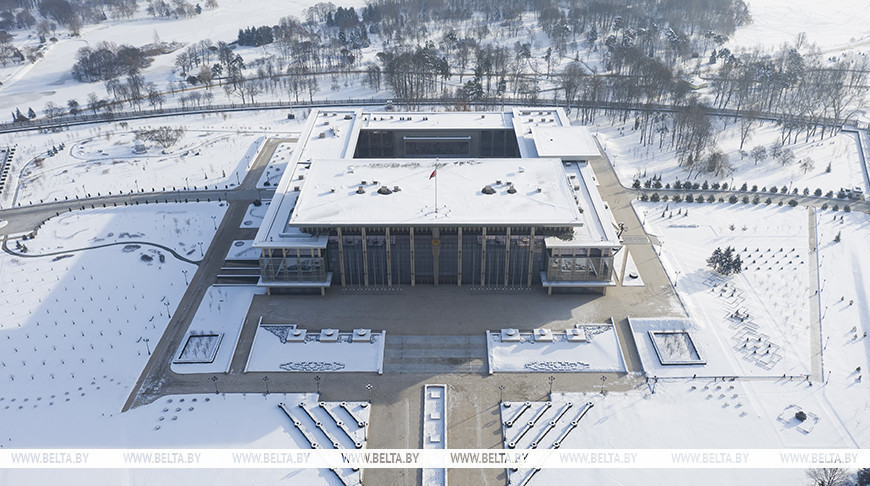
MINSK, 17 February (BelTA) - On 17 February, Belarusian President Aleksandr Lukashenko signed the law “On Amendments to the Codes on Criminal Liability” which provides for the comprehensive improvement of the criminal and criminal procedures legislation, BelTA learned from the press service of the head of state.
In accordance with the document, the punishment for 97 categories of offenses has been revised. Of these, 65 categories of offenses have been supplemented with alternative punishment, more lenient types of punishment (24 categories of offenses carried an imprisonment sentence as the only possible punishment until now). Adjustments in part of types of punishment were made to 32 other categories of offenses.
It is established that first-time non-serious offenders, women and single men raising children under the age of 14, minors and persons with disabilities of Group I shall not be deprived of liberty. The exception will be cases when a person commits crimes related to extremism or violence.
Traffic offenses that cause harm to close relatives or family members of the guilty person (part 2 of article 317 of the Criminal Code) are transferred to private-public prosecution cases (initiated at the request of the victim). The measure is intended to facilitate intra-family conflict resolution.The law strengthens counteraction to cybercrime. For example, it allows an opportunity to seize funds that are the subject of the crime. This will make it possible to promptly block stolen sums in accounts and ensure their return to victims. It also establishes a mechanism for blocking cell phone numbers, phishing sites and other internet resources used by criminals in criminal schemes.
The protection of the rights of juvenile participants in criminal proceedings will be enhanced. Now the participation of a teacher and a psychologist will be mandatory both during the interrogation of juveniles and also during confrontation and verification of testimony at a scene.
The law also provides for measures allowing courts to take a more flexible approach to sentencing for offenses related to drug trafficking.
The main provisions of the law shall enter into force ten days after its official publication.
As it has been reported, the bill was sent to the Parliament by the Belarusian president in August 2024. The bill was developed by an ad hoc group set up at the President Administration. Taking into account the instructions given by the head of state during the meeting on certain aspects concerning the improvement of legislation on criminal liability, the ad hoc group undertook a systemic analysis of the norms of criminal law and criminal procedures law in order to propose adjustments that would give courts more opportunities to individualize punishment depending on the gravity of the crime committed and to make criminal legislation more humane towards certain categories of persons.
In accordance with the document, the punishment for 97 categories of offenses has been revised. Of these, 65 categories of offenses have been supplemented with alternative punishment, more lenient types of punishment (24 categories of offenses carried an imprisonment sentence as the only possible punishment until now). Adjustments in part of types of punishment were made to 32 other categories of offenses.
It is established that first-time non-serious offenders, women and single men raising children under the age of 14, minors and persons with disabilities of Group I shall not be deprived of liberty. The exception will be cases when a person commits crimes related to extremism or violence.
Traffic offenses that cause harm to close relatives or family members of the guilty person (part 2 of article 317 of the Criminal Code) are transferred to private-public prosecution cases (initiated at the request of the victim). The measure is intended to facilitate intra-family conflict resolution.The law strengthens counteraction to cybercrime. For example, it allows an opportunity to seize funds that are the subject of the crime. This will make it possible to promptly block stolen sums in accounts and ensure their return to victims. It also establishes a mechanism for blocking cell phone numbers, phishing sites and other internet resources used by criminals in criminal schemes.
The protection of the rights of juvenile participants in criminal proceedings will be enhanced. Now the participation of a teacher and a psychologist will be mandatory both during the interrogation of juveniles and also during confrontation and verification of testimony at a scene.
The law also provides for measures allowing courts to take a more flexible approach to sentencing for offenses related to drug trafficking.
The main provisions of the law shall enter into force ten days after its official publication.
As it has been reported, the bill was sent to the Parliament by the Belarusian president in August 2024. The bill was developed by an ad hoc group set up at the President Administration. Taking into account the instructions given by the head of state during the meeting on certain aspects concerning the improvement of legislation on criminal liability, the ad hoc group undertook a systemic analysis of the norms of criminal law and criminal procedures law in order to propose adjustments that would give courts more opportunities to individualize punishment depending on the gravity of the crime committed and to make criminal legislation more humane towards certain categories of persons.













